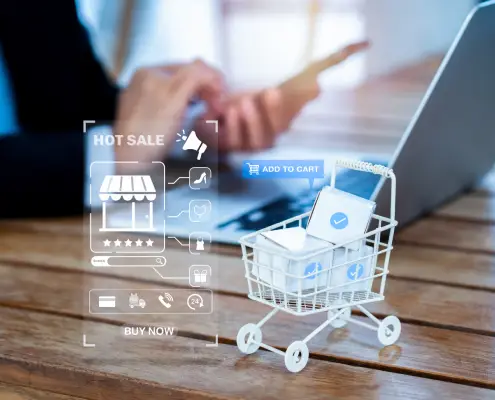Since the dawn of digitalization, many businesses have emerged victorious amidst the never-ending market competition. Out of all sectors adopting this new technology, it is the ecommerce industry that has specifically seen shifts from conventional to digital processes and approaches at many levels. If a survey is conducted now, the results will further make it clear that every seven consumers out of ten prefer to shop online rather than visiting the stores in person. So, it is evident that the ecommerce sector has truly evolved in what we can call a tech-advanced industry. But what amazes the most is that eCommerce is now adopting a new term, “digital commerce”.
While both terms might seem to be interchangeable, they do share a lot of differences. Digital commerce is more reliant on digitalization of conventional business processes to enhance customer experience, increase revenues and conversion ratio, improve business performance, and build an online brand repo. While it does sound exhilarating, implementation of D-Commerce comes with numerous challenges. So, if you are someone planning to steer your ecommerce business into the direction of digital commerce, this entire guide below will provide a clearer path for sure.
What is digital commerce?
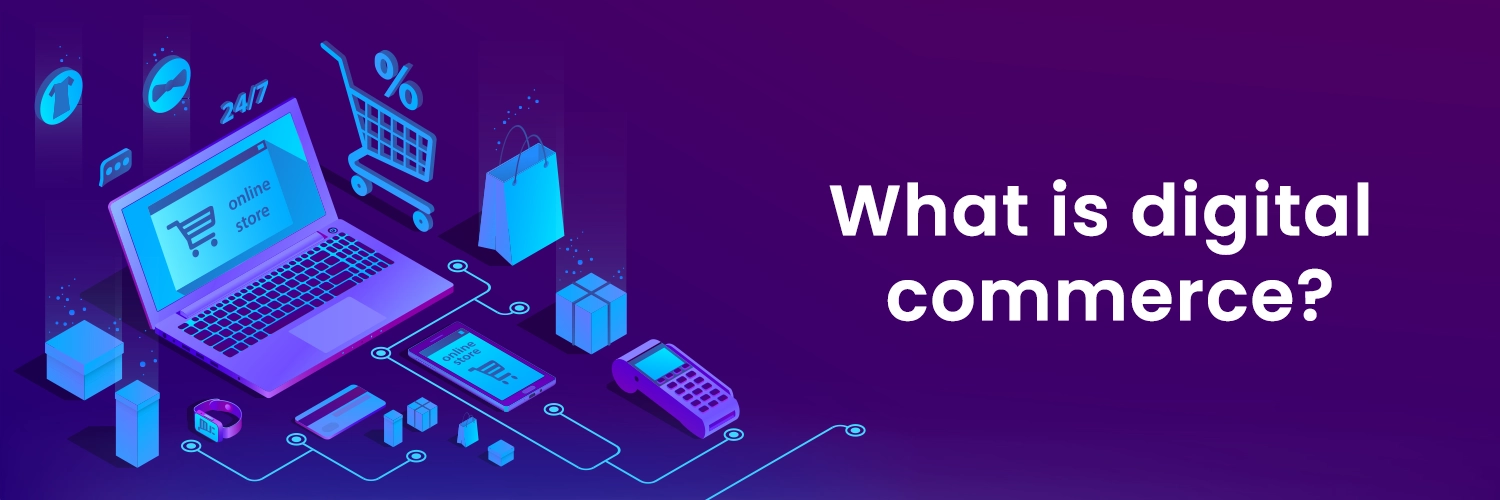
A recent study from Statista revealed that the number of global users in digital commerce is expected to rise by a whopping number of 5.5 billion by 2027. The number surely is promising a new future with an array of growth opportunities for businesses based on B2B and B2C models. But the question still remains unanswered: what digital commerce entails in real-time scenarios!
Digital commerce is a radical approach where digital platforms are used for performing buying and selling actions electronically. To put in simple words, D-Commerce is an umbrella term encompassing three major aspects, which are:
- Online transactions like debit and credit card payments or wallet payments.
- Electronic payments through different media.
- Digital marketing.
Furthermore, it also includes several other verticals like:
- Social commerce: Buying or selling products and services through different social media channels, like Facebook, Instagram, Twitter, and even YouTube.
- Mobile commerce: Buying and selling goods and services via mobile applications or websites, like Amazon, Ebay, and many more.
How does the digital commerce concept work?
The entire ecommerce sector relies on a global supply chain, where every phase of the chain might not be within the same time zone, geographical region, or demographic. For instance, a customer from Japan ordering a skincare product from a Turkish business via its online website can be considered to be a part of the global supply chain. Even though it is a vast and dynamic field, the global procurement and supply chains are highly fragile. They are susceptible to sliver of shifts in the market trends and conditions, including political unrests, geographical phenomena, inflation and recession, and many more.
So, digital commerce has to rely on two most pivotal core concepts- automation and predictive analysis. Below we have described how these two technologies have established their dominance over the market in recent times.
- Automation paves ways to reduce manual labor and time invested in directing consumers from the beginning of the marketing funnel to its end. In other words, automating all the phases of the funnel allows businesses to focus on triggering responses automatically based on consumer actions, choices, and other forms of data analytical reports.
- Predictive analysis is mainly concerned with acquiring humongous volumes of datasets from different consumer segments and implementing a complex analytical model. It is this model that is responsible for unraveling the hidden trends and patterns in the datasets and generating the desired responses for automated workflows. The datasets can be consumer choices, products viewed the most, actions taken from the beginning of visiting the online website, and so on.
Combining the principles of automation and predictive analysis provides businesses an edge by allowing them to master digital commerce and optimize the marketing strategies further.
How is digital commerce different from ecommerce?
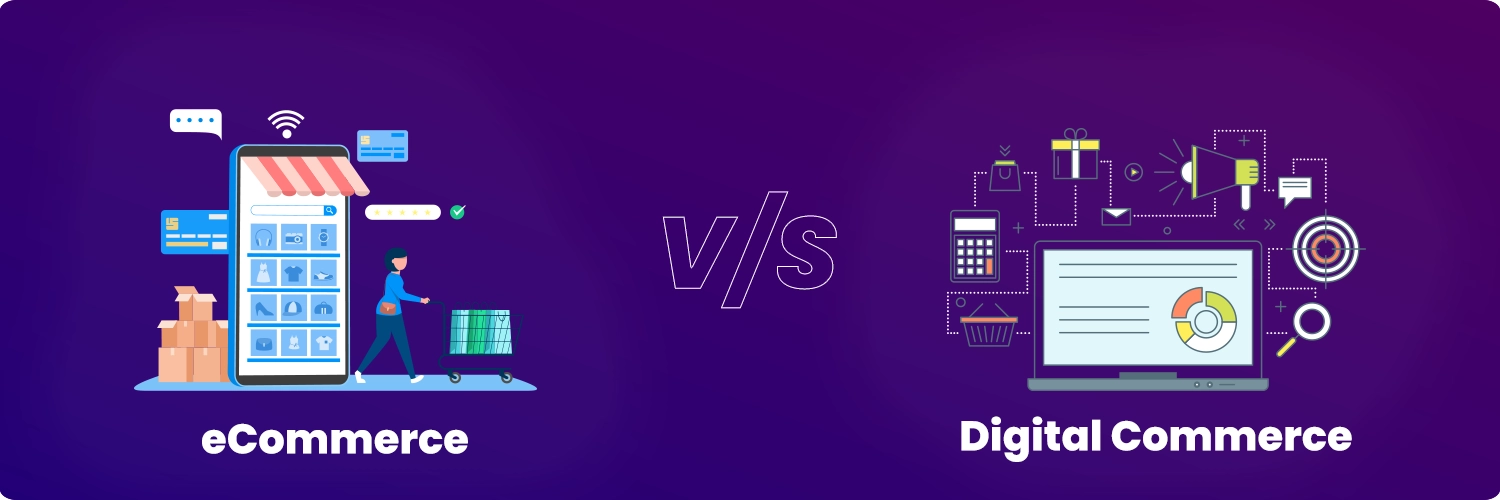
Since we are focusing on digital commerce, understanding its difference from ecommerce is imperative. Only then will you be able to make the right call at the right time for your business growth. Ecommerce means selling products online, whether through business listing on Google or using a business profile on Instagram. But digital commerce offers a far more in-depth and rational picture of the industry.
Instead, it allows businesses to make the buying and selling processes more granular based on automated triggers and data analysis. From understanding user sentiments to predicting behaviors based on products added to the cart previously, digital commerce offers a new vision to the marketers. In other words, it forms a direct connection between your virtual store and the consumers in a way where you offer them a real-time shopping experience as one would expect from a physical store.
What makes digital commerce more valuable to businesses?
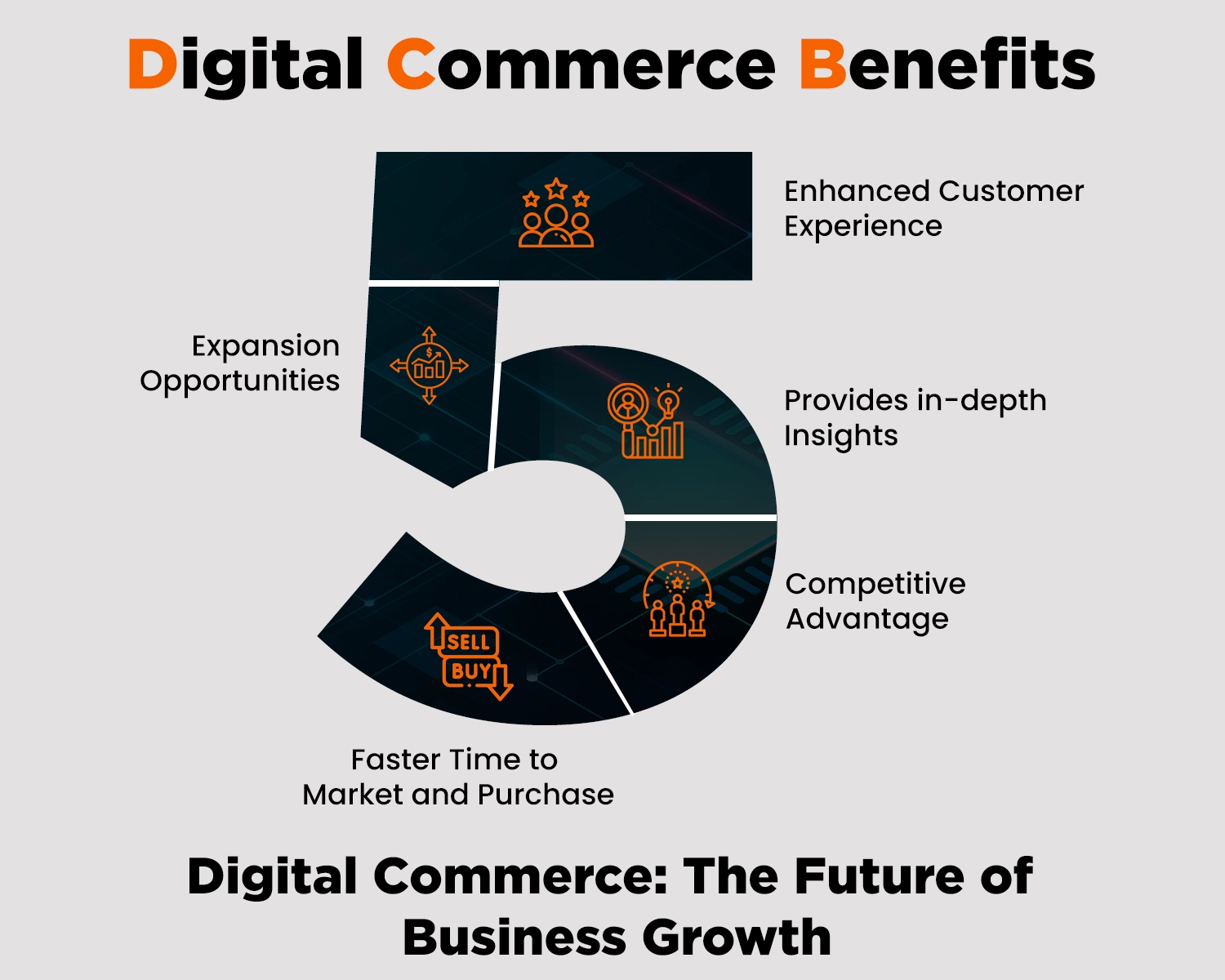
While there are numerous facts that make digital commerce solutions immensely valuable to businesses across the world, we will list here the most prominent ones. These reasons are what make D-Commerce an unparalleled aspect in the market.
Enhances customer experience
With digital commerce, marketers can focus more on amplifying customer journeys from the top to bottom of the marketing and sales funnels. It mainly revolves around three aspects:
- Time of product delivery.
- Quality of the delivered product.
- Relevance and accuracy of the delivered product.
With proper strategies, marketers enhance all these three aspects to ensure the customer experience can be improved by ten folds. Let’s consider an example where a customer from Sydney orders a product from Busan. Digital commerce allows marketers to optimize the delivery process by reducing delivery time while ensuring the quality and accuracy of the delivered product remain uncompromised at all costs.
Opens expansion channels
There is no doubt that a brick and mortar business will always be restricted to geographical locations. Only the highly successful brands with an annual turnover of hundreds of billions can open up physical stores at multiple locations around the world. This won’t be the same for small and medium scale businesses. So, the only option for expanding the target audience and business channels will be via digital commerce. It enables marketers to utilize various online platforms, like mobile apps, social media, and so on for fruitful business expansion.
Provides in-depth insights
As we have already discussed above, digital commerce services revolve around predictive data analysis. The analytical reports provide in-depth information about various aspects concerning the consumers, target audience, market, competitors, and so on. For instance, analyzing the re-orders over a span of three months will help marketers know the percentage of consumers ordering the same product multiple times or the product types that have received the maximum number of re-orders. With this, not only will they be able to improve other product categories but also ensure the number steadily grows in the coming quarter.
Allows to stay at par with the competition
The entire ecommerce market is hypercompetitive, with trends and patterns changing dynamically. For instance, consumers used to shop online through websites a couple of years back. But now, they are more dependent on mobile apps. Similarly, the trend of shopping through social media has also entered the limelight in recent time. So, to stay ahead of the competition and adapt according to these trends, businesses can implement digital commerce practices.
Faster time to market and purchase
Also, digital marketing fastens the time to market, allowing businesses to put up the products earlier on display and intrigue the target audience with various digital marketing tactics. As the buying journey can be personalized via automation and predictive analysis, the average time spent to traverse from the top to bottom of the marketing and sales funnels significantly reduces. Therefore, businesses won’t have to get anxious about whether or not the prospects will be converted to customers or not.
What are the emerging trends in digital commerce?
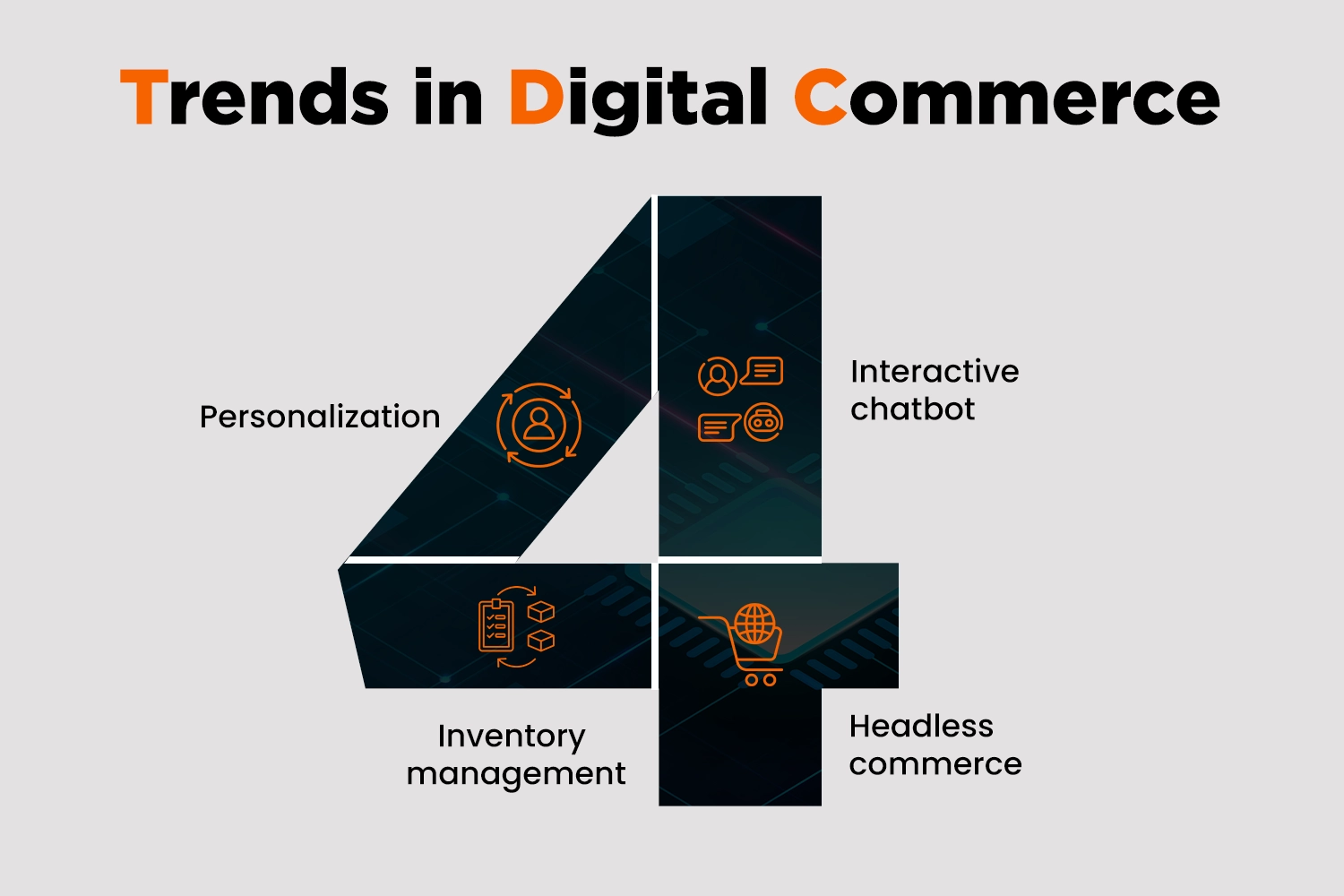
Personalization: One of the major digital commerce trends that businesses should follow is personalizing the consumer’s journey throughout. For instance, segmenting product lists based on filters can provide consumers a personalized shopping experience where they will be able to find the product they are looking for much earlier and in an easier way.
Interactive chatbot: It is better to guide the consumers along the marketing and sales funnels rather than leaving everything on possibilities. By integrating an AI-based chatbot, you can improve the interaction with your consumers and respond to their queries or provide assistance promptly.
Inventory management: By implementing predictive analysis, businesses should focus on inventory control and management. This way, consumers won’t have to get disheartened by knowing that the product they were looking for is out of stock. When the inventory generates alerts about depleting product stock, the automated model will place orders automatically without any human intervention.
Headless commerce: Another major digital commerce trend emerging in this present era is headless commerce. Here, the frontend and backend of the website are decoupled and handled separately. Once done, changes can be deployed to either end without impacting the other or reducing the server uptime.
Summing up
With a proper digital commerce platform, it is now possible for businesses to embark on a new journey of understanding customers at a deeper level and optimizing the processes accordingly. It can be knowing the consumer sentiments and streamlining interaction with the AI chatbot or raising curiosity in the users via email notifications about new product launches. D-Commerce is an emerging technology that will open up a host of opportunities for leveling up the customer experience, business revenue, brand image and reputation, and global outreach.




